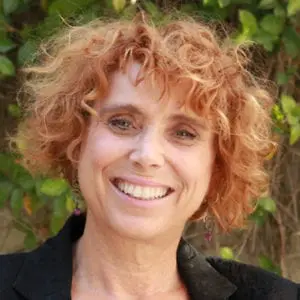The Help Group’s Enrichment and
Support Groups Go Virtual
Laurie Stephens, PhD, Director of Program Development
 When the Covid-19 “Safe At Home” orders were put into place, The Help Group immediately began to develop distance learning plans and curriculum to meet the unique needs of our highly diverse, special education student population. In addition, The Help Group focused on maintaining its robust mental health services to ensure that clients and families were able to continue to receive the same level of support and care through telehealth. These adaptations have turned out to be a resounding success with many parents and students reporting that they prefer distance learning!
When the Covid-19 “Safe At Home” orders were put into place, The Help Group immediately began to develop distance learning plans and curriculum to meet the unique needs of our highly diverse, special education student population. In addition, The Help Group focused on maintaining its robust mental health services to ensure that clients and families were able to continue to receive the same level of support and care through telehealth. These adaptations have turned out to be a resounding success with many parents and students reporting that they prefer distance learning!
Once these two extremely essential programs were put into place, The Help Group turned its attention to transferring all our enrichment, support and afterschool programming to a virtual platform. For Dr. Susan Berman, Chief Operating Officer and myself, it felt like taking a high dive into unchartered waters. There was little precedent for running, say, a virtual social skills group or a life skills class for cooking when shopping for ingredients was highly compromised. However, the need to help our clients and their families maintain a structure and routine to their days and to continue to provide consistency for them made the task of designing and implementing these programs a rewarding experience.
One of the most surprising aspects of the virtual classes was the broad reach they had. With our offerings on our website, brought participants from others states and countries. Many parents related they could not find any such virtual programming available for their children locally and expressed extreme gratitude at The Help Group’s ability to reach beyond the Los Angeles area. Below, we present some of the highlights of the programs we have offered and share in the success and benefit of virtual enrichment and support activities.

Kids Like Me: Our Kids Like Me program typically provides afterschool enrichment classes for children with autism spectrum disorder and other social-emotional challenges. After surveying families for interest, the following classes were offered: social skills, Worry Warriors to address anxiety, Fun and Fitness, yoga for beginners and two parent support groups. It turns out, the need to balance therapeutic classes with “fun” classes was exactly what our clients needed.
Many children and their parents participated in multiple classes. One parent commented that her son was very hesitant to attend the Worry Warriors group through an online platform and said over and over, “I’m not going to do it.” However, with encouragement from his mother, the 8 year old boy did attend, and after the first session told his mother he “loved it” (and didn’t miss a session after that!). Another parent shared that they learned something new about their child’s fears which in turn lead to them feeling more connected to the child. After just one social skills group, two boys decided to become “offline” friends with each other. Several others asked to exchange YouTube channels with each other in order to stay connected outside of class time. Overall, the children appeared to really enjoy the classes and were able to make friends despite not being able to meet face to face. The children and parents stated they gained valuable skills and insight through the therapeutic programs and found they enjoyed attending the Fun and Fitness and Yoga classes with their children. We also had many siblings join in which provided valuable bonding time for the whole family.
The parents also related that the support groups offered were extremely helpful. One parent mentioned she was relieved by the stories of “senior” parents, as her child had just received an ASD diagnosis and she felt adrift and alone until joining our group. Another parent mentioned how happy she was to be a part of the virtual group as it was easier to attend than in-person ones. This was, in fact, a common theme in all of our offerings. When the stress of shuffling the child back and forth to classes, therapies and school was removed, when parents didn’t have to worry about traffic or who could watch their children, they were in better space to focus on themselves and their needs which in turn lead them to feel more effective at parenting.
Kaleidoscope: Our Kaleidoscope program, for neurodiverse LGBTQ+ young people, moved its mental health sessions to telehealth and offered interactive, engaging social gatherings online Initially, many LGBTQ+ teens and young adults were reluctant to participate as they are not out regarding their sexuality and/or gender identity with family members who they are quarantining with. Some do not receive affirming support while at home, adding to an experience of anxiety or depressed mood that has gone along with the “safe at home” orders. Being able to connect with LGBTQ+ peers, allies, and affirming adults through Kaleidoscope has provided them the support they need to cope with all of their challenges more positively. As just one example, we had a young adult join us for our “Coffee Talk” support session from the Inland Empire. This young person was so excited and appreciative to be able to connect with other LGBTQ+ young folks through Kaleidoscope’s remote platform, when they would not have been able to do in person. In fact, we have had a larger and more diverse group of young people attending our events online than we did prior to quarantining. Some of our teenaged clients have expressed how much easier it is for them to participate from their bedroom, particularly when they may not have the support of their parents to be driven to an LGBTQ+ event or they are not out yet to their parents. Kaleidoscope plans to continue to offer virtual events, even when the “Safe at Home” orders are lifted, as the LGBTQ+ youth have expressed that this platform allows for them to feel safe and validated while bonding with others like them.
Our therapeutic services have also continued through telehealth and our clients have been able to overcome many initial challenges they faced. A couple of our LGBTQ+ clients who are also on the autism spectrum expressed concern about not being able to meet in person, due to sensory discomfort and social anxiety associated with phone calls or telehealth, concern that sessions would not be as private with family members nearby, and that disrupting the routine of in-person sessions would make them less meaningful and productive.
Fortunately, all our clients ultimately chose to put their mental health first. These clients were willing to be creative about where they can have private sessions (such as holding session in their car) and used the sessions as a means to help overcome their associated discomfort and anxiety. They have successfully engaged in sessions that are increasingly longer and easier to tolerate, noting that this experience is positively impacting their ability to engage with others on the phone as well. Despite being more physically restricted by being at home during this health crisis, our clients’ ability to engage with others has actually been broadened! As one family member put it to us, Kaleidoscope providing remote therapeutic services for the LGBTQ+ community, including those with autism, has been “an answered prayer.”
Advance LA: Advance LA, our program addressing the needs of young adults, smoothly transitioned to remote Life Coaching Services. Our client’s parents have shared with our Coaches that their young adults find their coaching sessions to be a source of strength and support during this very stressful time. Knowing that their coaches are consistently available for their regularly scheduled sessions provides a sense of stability and normality. Due to the accountability that Life Skills Coaching provides, our clients who are in college are staying current with homework, projects and test preparation. Clients who were laid off from their jobs due to the crisis are being assisted by their Coaches with completing unemployment insurance forms online, and working on exploring future avenues for employment. Both clients and parents have expressed a high level of gratitude for our ability to continue to offer Life Skills Coaching. One parent commented that they did not think their child would have been able to complete their college classes once they were switched to online learning without the passion and dedication of her coach.
Advance LA also offered a variety of social and enrichment classes for young adults with ASD. Clients were able to participate in self-care, cooking, mindfulness & meditation, college survival and college prep classes. One parent reached out to us to say that her child, who had never participated in a cooking class before, felt a strong sense of self-determination and independence by being able to take part in the class. His mother related that her son had not shown an interest in cooking before, but he found a passion and they now plan to continue to cook together.
Overall, The Help Group’s virtual programs have been a resounding success. We have been able to reach a much more diverse group of children, young adults and parents through this platform, not only in LA, but across the globe. Removing the stress of getting ready to go out for an event, juggling the family’s schedules and commuting clearly benefits the majority of those attending. It allows for more consistent attendance and for a readiness to learn that is not present during face to face events. Both our ASD clients and our LGBTQ+ clients related that being able to connect with others, while being in the safety of their own homes and with less unpredictable or uncontrollable sensory input improved their motivation to take part in our events. While we would not have predicted this prior to starting our classes, many parents and youth have asked us to continue with our virtual classes and supports. We look forward to this new opportunity to broaden our reach and continue to help as many young people and their families as we can.
